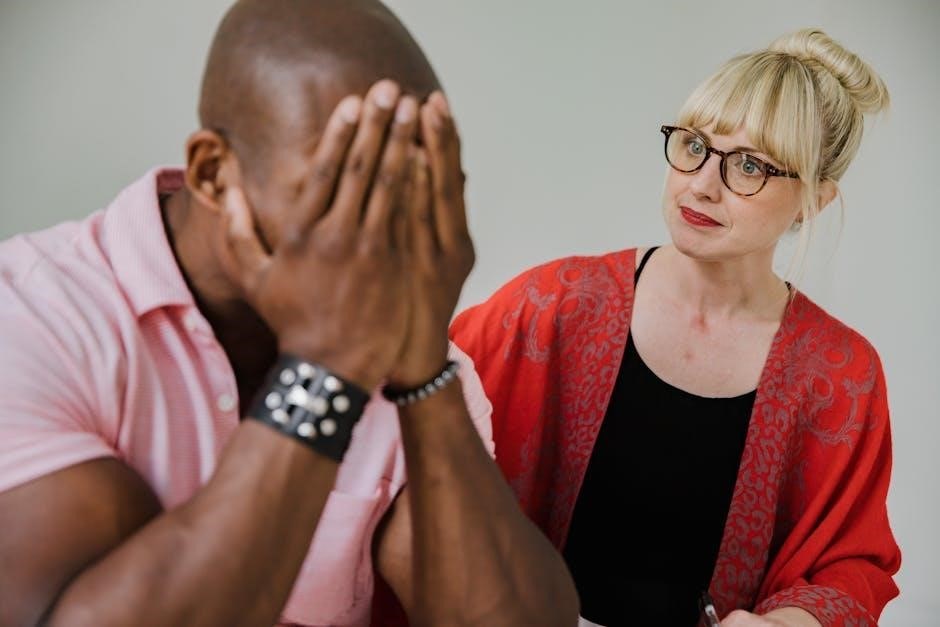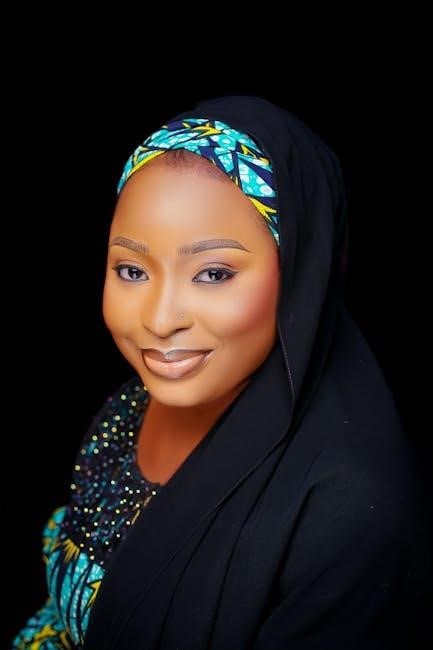Counseling the culturally diverse is a vital field addressing mental health needs across varied populations. It emphasizes cultural competence‚ understanding‚ and the challenges counselors face in a globalized‚ diverse world. This approach ensures inclusive‚ effective support‚ fostering social justice and equity for all individuals.

Overview of the Book
Counseling the Culturally Diverse‚ 9th Edition‚ provides a comprehensive exploration of multicultural counseling‚ offering insights into the complexities of working with diverse populations. The book is structured to address foundational theories‚ practical applications‚ and special issues in multicultural counseling. It covers topics such as cultural identity‚ social justice‚ and mental health disparities‚ while emphasizing the importance of cultural competence. The 9th edition includes updated research‚ case studies‚ and emerging trends‚ ensuring relevance to contemporary counseling practices. Written for both students and professionals‚ the book serves as a valuable resource for developing the skills and awareness needed to effectively counsel individuals from diverse cultural backgrounds. Its accessible style and thorough coverage make it an essential tool for fostering inclusivity and equity in mental health care.
Importance of Cultural Competence in Counseling
Cultural competence is essential for effective counseling in a diverse society. It enables counselors to understand and respect clients’ cultural backgrounds‚ values‚ and beliefs‚ fostering a stronger therapeutic relationship. This competence helps counselors adapt interventions to meet the unique needs of diverse populations‚ enhancing the likelihood of positive outcomes. Without cultural competence‚ misunderstandings and misdiagnoses can occur‚ leading to ineffective treatment. Culturally competent counselors are better equipped to address mental health disparities and promote social justice. By integrating cultural awareness into practice‚ counselors can provide more inclusive and equitable care. Ultimately‚ cultural competence is a critical skill for counselors to navigate the complexities of working with diverse clients‚ ensuring that all individuals receive respectful and effective support.

Theoretical Foundations of Multicultural Counseling
Theoretical foundations of multicultural counseling provide essential frameworks for understanding diverse client backgrounds‚ guiding counselors to develop culturally sensitive strategies that respect and address unique cultural differences effectively.
Multicultural Counseling Theories
Multicultural counseling theories provide frameworks for understanding the cultural dimensions of human behavior and experiences. These theories emphasize the importance of cultural awareness‚ knowledge‚ and skills in counseling practice. They address how cultural identity‚ power dynamics‚ and systemic oppression influence mental health and well-being. Key theories include the Multicultural Counseling Competencies‚ the Social Justice and Advocacy model‚ and the Theory of Multicultural Counseling and Therapy. These frameworks guide counselors in developing culturally responsive interventions and advocating for social justice. By integrating these theories‚ counselors can better understand and address the unique needs of diverse clients‚ fostering empowerment and resilience. Multicultural theories also highlight the need for self-reflection and continuous learning in working with diverse populations. They serve as foundational tools for creating inclusive and equitable counseling environments.
The Role of Cultural Identity in Counseling
Cultural identity significantly influences clients’ worldviews‚ behaviors‚ and mental health experiences. It encompasses race‚ ethnicity‚ gender‚ sexual orientation‚ and other social identities‚ shaping how individuals perceive themselves and their place in society. Understanding a client’s cultural identity is crucial for counselors to build rapport and trust‚ as it affects communication styles and expectations from counseling. Counselors must recognize how their own cultural identities interact with those of their clients to avoid biases and misunderstandings. Cultural identity also impacts how clients express symptoms and cope with challenges‚ highlighting the need for culturally sensitive interventions. By acknowledging and respecting these differences‚ counselors can create a supportive environment that fosters empowerment and resilience. Addressing cultural identity ensures that counseling is inclusive and tailored to the unique needs of diverse individuals‚ promoting social justice and equity in mental health care.
Counseling Specific Culturally Diverse Populations
Counseling specific culturally diverse populations requires understanding their unique cultural backgrounds‚ values‚ and experiences to provide effective and culturally sensitive support‚ addressing the diversity within each group and the challenges counselors face in adapting their approaches.
Counseling African American Clients

Counseling African American clients requires a deep understanding of their unique cultural‚ historical‚ and social experiences. The legacy of slavery‚ segregation‚ and systemic racism has shaped the collective trauma and resilience of this population. Counselors must address issues like racism-related stress‚ generational trauma‚ and the impact of microaggressions. It is essential to acknowledge the strength of African American cultural values‚ such as community‚ family‚ and spirituality‚ which often serve as coping mechanisms. Cultural competence involves understanding the client’s worldview‚ incorporating culturally relevant interventions‚ and being aware of the intersectionality of race‚ ethnicity‚ and other identities. Additionally‚ counselors should be sensitive to the historical mistrust of mental health systems and the preference for informal support networks within the African American community. Building trust and fostering a collaborative therapeutic relationship are critical for effective counseling outcomes.
Counseling Asian American Clients
Counseling Asian American clients requires cultural sensitivity to their unique experiences‚ which are shaped by diverse ethnicities‚ languages‚ and immigration histories. Many Asian Americans face challenges related to acculturation‚ such as balancing traditional values (e.g.‚ collectivism‚ respect for hierarchy) with Western norms. Mental health stigma and the expectation to maintain family honor can hinder help-seeking behaviors. Counselors must address the “model minority” stereotype‚ which often masks individual struggles and diversity within the Asian American community. Understanding the role of spirituality and traditional healing practices is crucial‚ as many clients may integrate these into their mental health journey. Building trust and cultural rapport is essential‚ as historical and interpersonal experiences may influence clients’ willingness to engage in therapy. A culturally competent approach ensures that counselors respect clients’ values while addressing their unique needs and strengths.

Counseling Hispanic/Latino Clients
Counseling Hispanic/Latino clients involves understanding their rich cultural diversity‚ including variations in country of origin‚ language‚ and immigration experiences. Cultural values such as familismo (family centrality) and respeto (respect) are central to their identity and should be honored in therapy. Many Hispanic/Latino individuals face challenges like immigration stress‚ acculturation‚ and discrimination‚ which can impact mental health. Counselors must address the stigma associated with seeking mental health services‚ a common barrier in this population. Spirituality and religious practices often play a significant role in coping and healing. Building trust and rapport is essential‚ as historical and interpersonal experiences may influence clients’ engagement. A culturally competent approach involves incorporating bilingual or bicultural interventions and respecting clients’ values while addressing their unique needs. This ensures effective and empathetic support tailored to their experiences and strengths.
Counseling Native American Clients
Counseling Native American clients requires a deep understanding of their cultural values‚ historical experiences‚ and unique challenges. Many Native Americans face issues related to historical trauma‚ cultural identity‚ and societal marginalization. Counselors must acknowledge the importance of community‚ spirituality‚ and the connection to nature‚ which are central to Native American beliefs. Building trust is crucial‚ as historical betrayals have led to skepticism toward external systems. Incorporating traditional healing practices and collaborating with tribal leaders can enhance the therapeutic relationship. Additionally‚ counselors should be aware of the diversity among Native American tribes‚ as each has distinct traditions and experiences. Addressing systemic inequities and promoting cultural resilience are key to effective counseling. A culturally sensitive approach ensures that clients feel respected and understood‚ fostering a safe space for healing and growth.

Addressing Special Issues in Multicultural Counseling
Addressing special issues in multicultural counseling involves understanding unique challenges‚ fostering cultural sensitivity‚ and implementing tailored strategies to support diverse client needs effectively and compassionately.
Immigration and Acculturation Issues
Immigration and acculturation issues are central to multicultural counseling‚ as they involve navigating cultural‚ social‚ and psychological transitions. Immigrants often face challenges such as cultural shock‚ language barriers‚ and discrimination‚ which can lead to mental health concerns like anxiety and depression. Counselors must understand the complexities of acculturation‚ including identity conflicts and the tension between maintaining heritage and adapting to a new culture. Additionally‚ the impact of systemic factors‚ such as immigration policies and societal attitudes‚ cannot be overlooked. Effective counseling requires cultural competence to address these unique experiences‚ validate clients’ struggles‚ and empower them to thrive in their new environments. By acknowledging the resilience and strengths of immigrants‚ counselors can foster a supportive and inclusive therapeutic relationship.

Social Justice and Advocacy in Counseling
Social justice and advocacy are integral to multicultural counseling‚ emphasizing the need to address systemic inequalities and promote fairness. Counselors play a crucial role in empowering clients to navigate oppressive systems and challenge discrimination. Advocacy extends beyond individual therapy‚ involving efforts to influence policies‚ educate communities‚ and create equitable environments. It requires counselors to be culturally aware‚ recognizing the historical and ongoing impacts of marginalization. By advocating for social justice‚ counselors can help dismantle barriers to mental health care and support the well-being of diverse populations. This approach fosters resilience and empowers individuals and communities to thrive despite systemic challenges. Counselors must also engage in self-reflection‚ acknowledging their own biases and privileges‚ to effectively advocate for justice and equity in all aspects of their work.
Mental Health Disparities in Diverse Populations
Mental health disparities in diverse populations are significant and often rooted in systemic inequities. Marginalized groups‚ including racial and ethnic minorities‚ face barriers to accessing quality care. These disparities stem from factors like socioeconomic status‚ cultural stigma‚ and limited access to resources. For instance‚ communities of color may experience higher rates of untreated mental health conditions due to mistrust of the healthcare system or lack of culturally competent providers. Additionally‚ language barriers and immigration status can further exacerbate these challenges. Addressing these disparities requires a commitment to cultural competence‚ policy reform‚ and community-based interventions. Counselors must advocate for equitable mental health services and work to dismantle systemic barriers that prevent diverse populations from receiving adequate care. By doing so‚ they can help reduce the gap in mental health outcomes and promote overall well-being for all individuals.
Professional Development in Multicultural Counseling
Professional development in multicultural counseling involves ongoing education‚ self-reflection‚ and skill enhancement to effectively serve diverse clients. It fosters cultural awareness and continuous improvement in counselors’ competencies and practices.
Developing Cultural Competence
Developing cultural competence is a dynamic process that involves gaining awareness‚ knowledge‚ and skills to effectively counsel diverse populations. It requires self-reflection‚ understanding of one’s own biases‚ and a commitment to lifelong learning; Counselors must engage in ongoing education about diverse cultures‚ including history‚ values‚ and beliefs. Building cultural competence also involves developing empathy and the ability to navigate cultural differences. Practical steps include seeking supervision‚ engaging in cross-cultural interactions‚ and incorporating feedback from clients. Cultural competence is not a destination but a journey‚ requiring continuous growth and adaptation. It ensures that counselors can provide inclusive‚ respectful‚ and effective services to individuals from all backgrounds. By fostering cultural humility‚ counselors can better address the unique needs of their clients and promote social justice in the counseling relationship.
Ethical Considerations in Multicultural Counseling
Ethical considerations in multicultural counseling are central to ensuring respectful and equitable care for diverse clients. Counselors must adhere to professional standards while navigating cultural differences. This includes respecting clients’ values‚ beliefs‚ and practices‚ even when they differ from the counselor’s own. Avoiding cultural bias and stereotyping is crucial‚ as is obtaining informed consent and maintaining confidentiality. Counselors must also address power dynamics and recognize the impact of systemic oppression on clients’ mental health. Additionally‚ they are ethically obligated to advocate for social justice and challenge inequities within and outside the counseling relationship. Continuous self-reflection and cultural competence training are essential to uphold ethical practices. By prioritizing these principles‚ counselors can foster trust and create a safe‚ inclusive environment for all clients‚ regardless of their cultural background.

Future Directions in Counseling the Culturally Diverse
Future directions in counseling the culturally diverse emphasize advancing cultural competence‚ leveraging technology‚ fostering global collaboration‚ and addressing mental health disparities through continuous education and research.
Emerging Trends in Multicultural Counseling
Emerging trends in multicultural counseling highlight the growing emphasis on cultural humility‚ social justice advocacy‚ and evidence-based practices tailored to diverse populations. There is a rising focus on integrating technology‚ such as telehealth‚ to expand access to mental health services for underserved communities. Additionally‚ the field is moving toward a more intersectional approach‚ recognizing the complexity of identities and experiences. Counselors are increasingly being trained to address systemic inequities and promote equity in mental health care. These trends reflect a shift toward more inclusive and adaptive counseling practices‚ ensuring that services are responsive to the evolving needs of a global and diverse clientele. By embracing these innovations‚ the field continues to advance its mission of fostering mental health and well-being across all cultural groups.
The Role of Technology in Multicultural Counseling
Technology has revolutionized multicultural counseling by enhancing accessibility and cultural adaptability. Telehealth platforms now enable counselors to reach diverse populations globally‚ breaking down geographical barriers. Digital tools offer culturally sensitive resources‚ such as multilingual assessments and interventions‚ ensuring services are tailored to clients’ unique backgrounds. Virtual reality and AI-driven applications are emerging‚ providing immersive experiences to address cross-cultural challenges; Technology also facilitates ongoing counselor training‚ with simulations and modules that promote cultural competence. Despite these advancements‚ ethical considerations remain crucial to safeguard client privacy and ensure equitable access. By integrating technology thoughtfully‚ counselors can bridge gaps in mental health care‚ fostering inclusivity and effectiveness in multicultural settings. This evolution underscores the potential of technology to transform and enhance the field of multicultural counseling.
Global Perspectives on Multicultural Counseling

Global perspectives on multicultural counseling emphasize the importance of understanding diverse cultural norms‚ values‚ and mental health practices worldwide. As societies become increasingly interconnected‚ counselors must adopt a global lens to address the unique challenges faced by individuals from varied cultural backgrounds. This approach recognizes that mental health issues and help-seeking behaviors are shaped by cultural beliefs and societal expectations. By integrating global perspectives‚ counselors can develop more inclusive and effective interventions that respect the cultural identities of their clients. International collaborations and cross-cultural training are essential for fostering competence in addressing the mental health needs of a global population. This global viewpoint not only enriches the field of multicultural counseling but also prepares counselors to navigate the complexities of an increasingly diverse and interconnected world.